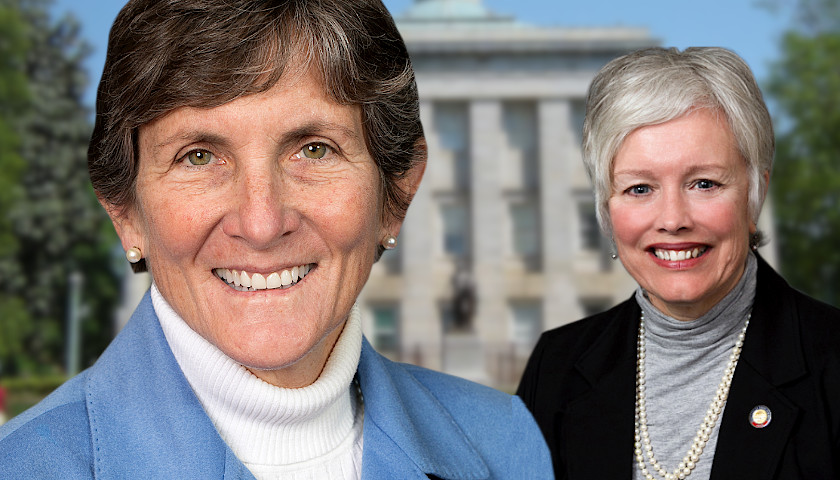North Carolina State House Representatives Pricey Harrison (D-D61) and Susan Fisher (D-D114) filed a bill on Monday that contains a progressive agenda wish list of tax reform rollbacks and social justice inspired mandates.
House Bill 46, is titled the “Economic Security Act of 2019,” and includes items such as barring public employers from looking into the criminal history of an applicant and increasing the minimum wage.
Here is what the bill seeks to do:
- Increase the minimum wage to $15 over 5 years statewide; no distinction is made for public or private and the raises would happen on Labor Day each year.
- “Mandate” equal pay for equal work regardless of experience or education.
- Require mandatory paid sick leave and family medical leave
- Increase the ‘tipped’ minimum wage.
- End “wage theft.”
- “Ban The Box” or which is removing the checkbox indicating a criminal record on employment applications.
- Bar public employers from looking into the criminal history of an applicant until a ‘conditional’ offer is made.
- Remove the ban on unions for public employees in the state
Reinstate the earned tax credit. - Reinstate the old child care tax credit and old employment expense tax credits.
The majority of the bill appears to include a series of re-writes of General Statute 95-25.2.
In line with the national Progressive agenda wish list, Section One of House Bill 46 orders the state’s minimum wage to be raised each Labor Day. The wage would be raised to $8.00 in 2019, $9.50 in 2020, $11.00 in 2021, $13.00 in 2022, and $15.00 in 2024.
Section Two on ‘equal pay’ says that “no employer shall pay any person in the employer’s employ at wage rates less than the rates paid to employees of the opposite sex in the same establishment for the same quantity and quality of the same classification of work.” The only distinction in pay that is allowable according to the bill language is that of “seniority.” Experience, education or training are not included as reasons an employer can pay one person more than another.
Section Three A deals with the “protection of employees from losing their jobs and pay” if they are out of work looking for medical care for themselves and their family and would add a statute added to Chapter 95.
Much of the section titled “Healthy Families and Healthy Workplaces Act” is recycled from a 2009 bill of the same name sponsored by both Harrison and Fisher.
The definition of “employer” used in section 3A would include both public and private businesses: “Employer” includes any person acting directly or indirectly in the interest of an employer in relation to an employee
Section Four attempts to rewrite state statute on employees who earn tips. According to current state statute, a “tipped employee” means any person who receives more than $20.00 a month in tips.
It is unclear what this section of the bill on tipped employees is trying to do. The first part says that only up to $5.00 per hour of earned tips are to be counted as wages. In the same section, the bill says that tips “shall not be counted as wages.”
Section Five, or “wage theft,” changes some of the existing statutory language to keep employers from taking advantage of employees in the assignment of hours, wages paid for their hours and other compensatory items associated with a job.
Language added under Section Five includes penalties an employer would be subject to if they are not in compliance. Employers would have to pay actual damages that include, “but are not limited to,” lost wages and benefits plus interest. If the case is tried in a court, a judge can fine the employer $500.00 per employee per violation.
The proposed increased minimum wages would be included in such violations an employer could be assessed with. A remedy included for non-compliance allows an employee to put a lien on any property or business owned by the employer.
Section Six is the “ban the box” section whereby the checkbox used to indicate a criminal record would be removed. Public sector employers may not inquire into a person’s criminal history at all until a “conditional” offer has been made for the job.
“A hiring authority may not inquire into or consider the criminal history of an applicant for public employment, or include any such inquiry on any initial employment application form, until the hiring authority has made a conditional offer of employment to the applicant.”
Section Seven is about allowing unions in public and state employment. It’s currently illegal in North Carolina for public employees to unionize. House bill 46 repeals General Statute 95-98, which is the ban on collective bargaining by public employees.
The last three sections of the bill are on taxes. It’s no secret that the removal of the Republican tax reform has been on the North Carolina Democrats progressive agenda since the day they were passed.
Section Eight’s opening language seeks to ‘reenact’ the earned tax credit and does this by changing the language to make the credit worth 5% effective January 1, 2020, and would sunset it a year later. One year of an earned income tax credit seems like a waste of time.
Section Nine of House Bill 46 wants to ‘reenact’ the child care tax credit, but the proposed schedule in the bill is overly complicated.
The credit is split up into a sliding rate scale of ‘type A’ and ‘type B’ percentages. The two types, A and B, appear to make distinctions about the mental or medical status and age of the child or dependent being claimed but isn’t very specific. The bill’s proposed percentage schedule also has no realistic income cap for claiming one of these credits.
As a point of reference, 2013 was the last year North Carolina had a child care tax credit. This credit was replaced by increases in the standard deductions as part of the 2014 tax reforms.
Before the 2014 tax reforms, the standard deduction for filers was $3,000 single or married filing separately, $6,000 married filing jointly and $4,400 for head of household.
After the Tax Simplification and Reduction Act (House Bill 998) was passed, those deductions changed in 2014 to $7,500 single or married filing separately, $15,000 married or filing jointly, and $12,000 for head of household.
The standards deductions continued to be increased over time and now stand at $8,750 single or married filing separately, $17,500 for married or filing jointly, and $14,000 for head of household.
The standard deductions will increase again in 2019 to $10,000 for single or married filing separately, $20,000 married/filing jointly, and $15,000 for head of household.
The child tax credit was changed to a deduction in 2017. Prior to being changed to a deduction, the credit had been increased to $125. The change from a credit to a deduction lowers taxable income. The size of the deduction is based on filing status and the amount of adjusted gross income.
The NC Department of Revenue’s schedule lists those married/filing jointly or filing as head of household making under $40,000 reaping a $2,500 deduction. The size of the deduction drops $500 for each additional $20,000 income increase thereafter. Those making $120,000 and over receive zero deduction.
Under the old child care credit, only up to 13 percent of qualifying expenses could be taken off one’s tax bill. There were also limits on this credit that included a maximum of $390 per dependent and a dependent cap of $780.
This section on child care credits also includes bringing back revised employment tax credits that are capped at $3,000 for one qualifying individual and max out at $6,000 for more than one qualifying individual.
As of January 1, 2019, the North Carolina tax rate for individual taxable income dropped from 5.499% to 5.25%.
More information on recent North Carolina personal tax changes can be found via the state’s Department of Revenue bulletin.
– – –
A.P. Dillon is the North Carolina Bureau Chief for The Tennesee Star and a reporter at Battleground State News. Follow A.P. Dillon on Twitter. Email Tips to [email protected].
Photo “Pricey Harrison (left)” by Pricey Harrison. Photo “Susan Fisher (right)” by Susan Fisher. Background Photo “North Carolina Capital” by Ron Cogswell. CC BY 2.0.





